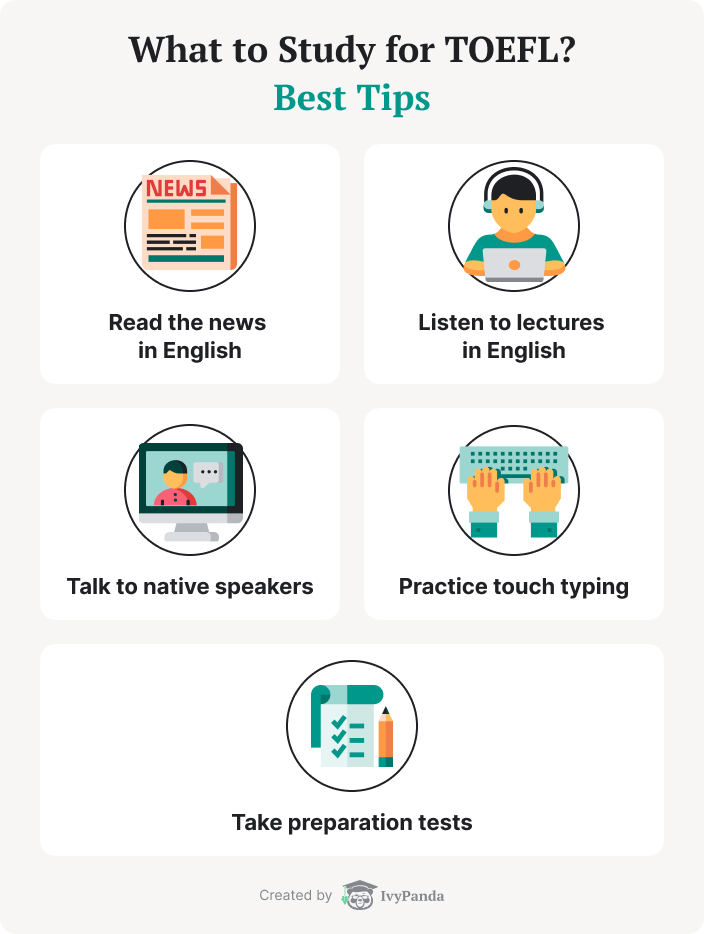If you need a good 🥊 kick up the backside to prepare for the TOEFL exam, here it is.
We have selected the best TOEFL tips and strategies to make your home preparation course the most efficient possible.

Here you will get:
- priceless advice on building your TOEFL study plan;
- understanding of how long it takes to prepare for the TOEFL exam;
- a list of the best websites to practice all four exam sections.
In this article, we use TOEFL while speaking of TOEFL iBT (internet-based test). Mind that CBT (computer-based tests) and PBT (paper-based tests) are still available in many countries. These formats differ by the length and time given for each section.
Okay, let’s get to it!
💯 TOEFL Tips for the Highest Score
TOEFL is designed for non-native speakers. It tests your readiness to live and study in an English-speaking environment. The exam verifies how you speak, write, read, and understand spoken language.
Good news: TOEFL is based on the real-life version of the English language. It contains no sophisticated grammar or archaic constructions. You need to show that you understand the message and make your listeners and readers understand you. For this reason, getting the highest score is realistic.

The fundamental thing you shall do is approach it comprehensively.
Get to Know the TOEFL Format
If you express your thoughts in English competently and can easily understand the native speakers, here’s what you have to learn. Mastery of language does not guarantee that you will succeed with all the tasks intuitively.
Know the format and specific requirements of each section!
- TOEFL checks four communication skills: reading, listening, writing, and speaking. Each section combines two or three skills, although they have separate names.
- The test lasts for 3 hours. You will have half an hour more to check the answers.
TOEFL Preparation Time
How long does it take to prepare for the TOEFL exam?
- We recommend training yourself by self-study for at least three weeks.
TOEFL preparation time is the most hot-button issue for anyone with a test pending. (un-)Luckily, there is no definite answer. The better your English is, the less time you need.
Below you will find out TOEFL success keys, ways to structure your preparation, and approximate timeframes.
Intensive preparation for one month can guarantee you a high score.
What to Study for TOEFL?
The first things that come to mind are grammar and vocabulary. But language competence is far more comprehensive. It comprises stylistics, syntaxis, pronunciation, comprehension of different foreign accents, etc. So, what can you do to prepare?

- Read the news in English. Instead of flipping through your Facebook thread, dive into more qualitative content. BBC news is a perfect option for news, and Popular Science Homepage provides innumerable articles on popular sciences.
- Listen to lectures in English. Everyone has a hobby. Even if you think you have not, you are wrong. There is something you dedicate most of your free time to. Look it up in the English-speaking YouTube. Turn on the subtitles. Shortly you will notice how much you understand without them.
- Talk to native speakers. If there is no such opportunity, find a friend who can switch to English while communicating with you. If you have no such friend, record yourself speaking in front of a mirror.
- Practice touch typing. It usually takes three days of discomfort to switch from four-finger to ten-finger typing. Then the speed will gradually grow.
- Take preparation tests. It is the most efficient approach. You will get used to the test types and the general test environment. But more importantly, you will know your gaps that require additional training.
🧭 How to Prepare for TOEFL — Study Plan
We have briefly mentioned the four sections above. But what exactly do you need to perform?
How can you make the most out of the last weeks left before the exam?
Are there any tips and tricks to simplify the task?
Find the answers below 👇
TOEFL Reading Section
This part assesses your understanding of the written academic test. You need to show how you manage the reading tasks being an international student. Most texts are taken from introductions to articles on different disciplines.
Do not worry if you are unfamiliar with the given subject field. All the information required to answer the questions is available in the excerpt.
Having done some calculations, we found that there’re 1.48 minutes per one question. Indeed, you can need more or less time to find the answer.
TOEFL Reading Types of Questions
TOEFL Reading Tips
TIP 1️⃣
Try reading the questions before the text. Here’s the trick: take three texts and read the questions to them primarily. Take another three pieces and read them first, and then the questions. Measure the time at all instances. It will show you if the strategy is effective for you.
TIP 2️⃣
Some people prefer reading the questions one by one and finding the answer in the text without reading the entire passage. It can save you some time but raises the error probability.
TIP 3️⃣
If you cannot decide on the correct answer, leave it for last.
TIP 4️⃣
The test designers know which words are not familiar to most international students. For this reason, they insert clues that can help you understand the meaning of complicated words. Learn to find them.
TIP 5️⃣
Find out which approach works for you and which steals your time. Make it work for you, not the other way around.
TOEFL Listening Section
This part lasts for 41 minutes, where instructions take 3.5 minutes, 21 minutes go to audio tracks, and 16.5 minutes for choosing the correct answers.
Thus, you get only 30 seconds per question.
It is critical to remember that you cannot return to the previous question once answered. Moreover, skipping a question can hurt your score. That’s why you should answer each question as they appear.
TOEFL Listening Types of Questions
TOEFL Listening Tips
TIP 1️⃣
Practice note-taking whenever possible. Over time, you’ll master this skill without getting distracted from the listening itself. You can take notes while listening to the audio file. But if you don’t practice note-taking, it will just consume your short-term memory during the exam. It can as well make you miss some other essential information.
TIP 2️⃣
Unlike reading, it is always better to know the questions in advance in the TOEFL listening section. Read them through before the lecture or conversation starts.
TIP 3️⃣
In conversations, people usually make a pause before saying something meaningful. Pay attention to the minor details and sounds.
TIP 4️⃣
Note other intonation highlighters: repeating, paraphrase, louder and clearer pronunciation of some words, and stress.
TOEFL Speaking Section
Here you’ll have to answer four questions. The first one is an oral essay or independent speaking task, and the other three are integrated speaking tasks.
You need to tell your answers into the headset. Your speech is recorded and checked by a combination of artificial intelligence and human correctors.
TOEFL Speaking Types of Questions
TOEFL Speaking Tips
TIP 1️⃣
When practicing for this section, use a timer. It is much more difficult to speak, knowing that your time is limited. Aim for completing the answer on time: not too early and not too late.
TIP 2️⃣
You are supposed to speak about your experiences, thoughts, and opinions. Use the information from the questions, lectures, and texts you are provided with. Then add a personal tinge.
TIP 3️⃣
If, during practice, you make long pauses, think why you do so. Make up a strategy of actions in case you don’t know what to say. Write down a couple of general phrases that would fit any topic and give you time to think of other ideas.
TOEFL Writing Section
It contains only two tasks.
TOEFL Writing task 1 lasts for 20 minutes & has a 150–225-word limitation.
TOEFL Writing task 2 lasts for 30 minutes & requires at least 300 words.
TOEFL Writing Tips
TIP 1️⃣
Before you start the writing, outline the future text. For an argumentative essay, three ideas are enough. Use the most substantial arguments to start each main body paragraph.
TIP 2️⃣
Grammar variety gives you more points. Once you have written the text, check if you have added different grammatical structures and used various tenses.
TIP 3️⃣
If you doubt the correctness of a word or a sentence, rephrase it.
TIP 4️⃣
Make the transitions between paragraphs clear and smooth. Transition words can help you with that.
TIP 5️⃣
Try to write in short sentences but avoid oversimplification.
📚 What Are Some Good TOEFL Resources?
The books, online courses, training apps, guides – there are so many of them that one can spend days searching for the best ones.
We have made this part of the work for you!
Below you can explore the best study TOEFL resources to prepare at home.
Best TOEFL Preparation Resources
💨 How to Prepare for TOEFL in 10 Days?
Are you a thrill-seeker who left the preparation for the last moment? And now you wonder how to prepare for TOEFL in 10 days?
It’s okay. We can deal with that.
Here is your TOEFL study plan for 10 days (also valid for one week):
- Dedicate a day to familiarize yourself with the test structure. Look through the test samples, inspect exam organization: time & word limits, sequence of the tasks, and main requirements.
- Take practice tests every day. You must complete the test from A to Z without breaks (other than official 10 minutes after Listening) to get used to the natural exam setting.
- Re-take the tests that you’ve done before. Compare the results and write down your most repeated errors. Polish your performance until you understand all the secrets.
- Train yourself on the most complicated question types. Rather than only doing the entire test, devote some time to sharpen each task separately. Start with the toughest ones.
- Surround yourself with English. Listen, watch, read, and say everything in English. Look through some essay samples to familiarize yourself with the writing style. Arrange total linguistic immersion for these ten days. Here, the key idea is to start thinking in English and not waste time translating from your native language inwardly.
- Needless to say, practice every day. Make up a schedule. Here is a 2-week plan, though you can borrow the main idea. Combine theory and practice, structure your program, and move step by step. Avoid doing it all at once.
How to Prepare for TOEFL in 2 Days?
Wow, you are breaking bad now.
If you happen to start your preparation marathon a couple of days before the great day, it is critical not to panic. In stress, you’ll forget even what you knew pretty well.
Sit back, relax, and do the following:
- Look through the test format and rules (we’ve made a brief description of all sections above). Two days are not enough to improve your English skills. But it’s enough to familiarize yourself with the exam structure and rules.
- It would be wise to address a tutor. They can train you for two days, selecting the most complicated tasks or the ones where you make the most mistakes. It is also the best option for those who wonder what to start with. Think of investing in this rather than struggling by yourself.
- If you’ve decided to prepare on your own, here is what you can do:
- Start with the reading section. Most people think it is the easiest part. If you cope with it without too many mistakes, move on.
- The listening section is the second most straightforward part. Try a couple of tests. Memorize what kind of information the questions check. Which lectures or conversations were the most challenging? Listen to similar texts while having a meal or on the go.
- Look through the writing tasks. Do you know what to answer? Make up an outline for a couple of essays to train the five-paragraph essay structure.
- Record yourself speaking, and then listen to yourself. What could be improved?
No matter how much time you have to prepare for the TOEFL exam, the main thing you should know – the game rules. What do the test creators expect from you? How is each section scored, and which skills does it check?
Answering these questions is nearly half of the overall success.
That’s all for today!
Keep calm and pass the TOEFL successfully!



